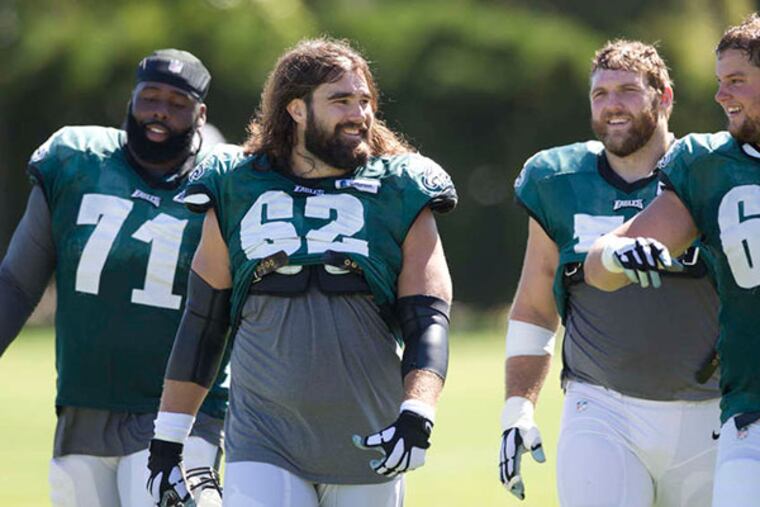Blocking must improve no matter who's carrying ball
From the sidelines of the NovaCare Complex's practice fields Thursday, wearing a baseball cap and resting his injured hamstring, DeMarco Murray had a better view of the action than any that he got during his first two games with the Eagles.

From the sidelines of the NovaCare Complex's practice fields Thursday, wearing a baseball cap and resting his injured hamstring, DeMarco Murray had a better view of the action than any that he got during his first two games with the Eagles.
Murray has averaged a foot-and-a-half per carry so far this season. He's taken 21 handoffs from Sam Bradford, and instead of holes and running lanes opening before him, he's usually had opposing defenders fill his field of vision and drag him to the ground. Now he might sit out Sunday's game against the New York Jets, a game that qualifies as a must-win for the 0-2 Eagles, and there's a cutting irony at the heart of this development: If Murray, the man who led the NFL in rushing last season, does sit out Sunday, it will do little damage to the Eagles' chances of winning in East Rutherford and saving their season.
It's counterintuitive, but it's the truth. Murray's absence would be nothing more than a convenient crutch for the Eagles if they lose to the Jets and fall to 0-3. Though the injury could extend what's been an awful beginning to Murray's career here, it shouldn't be an excuse for another awful outing from a team that has bigger problems than a running back who loses yardage because of poor blocking.
"That is fair to say," tackle Lane Johnson said. "If you don't have any lanes to run through, it doesn't matter who's getting the ball."
Murray's unproductive start isn't a cause of this early-season crisis for the Eagles. It's a symptom. It's a result of a host of other issues, among them the skittish play of Sam Bradford, the apparent predictability of Chip Kelly's play-calling, and above all an offensive line that hasn't given Murray a fighting chance to gain anything.
He has 11 total rushing yards over two games. For all the legitimate questions about Kelly's player-personnel decisions, about the Eagles' lack of depth along the offensive line and Kelly's fondness for collecting players who tend to end up on the daily injury report, no one had prepared for this possibility when the Eagles signed Murray in March.
No one had considered that Murray might be healthy but irrelevant. But remember: The Eagles did prepare for the scenario that played out Wednesday, for the possibility that one day Murray might pull up lame at practice and become a question mark for their next game. They had prepared for the possibility that Murray - a player with a history of hamstring injuries who had played a 16-game regular season once in his four years in the NFL - would hurt his hamstring.
Kelly may have left some other positions short, but once he traded LeSean McCoy to Buffalo and left the roster with just one proven player in the backfield, Darren Sproles, he took care to gird up the running backs. After signing Murray to a five-year contract that could pay him $40 million, the Eagles also brought in Ryan Mathews for three years and what could be as much as $11.5 million. Mathews had missed his share of games, too - 20 of a possible 80 over five seasons with the San Diego Chargers. His injuries included two concussions, a broken clavicle, and an MCL sprain, and perhaps a realistic perspective on his past, and on Murray's, made him more amenable to sharing playing time.
"When I signed up here, I knew what I was getting into," said Mathews, who played just six snaps last Sunday against the Dallas Cowboys. "I knew everything, with DeMarco being here, that he would be the main guy and whatnot. I knew what I was getting myself into."
Mathews was a 1,000-yard rusher twice in San Diego, and the logic behind his decision to join the Eagles made sense in the context of Kelly's first two seasons as head coach. A fast, run-based offense. Lots of plays, lots of opportunities, lots of yards. Murray surely saw the same potential upside. But those expectations were rooted in the belief that Kelly's scheme and system would continue to keep teams off balance, that Bradford would present a downfield-passing threat, and that the Eagles could handle the slanting penetration by defensive linemen that so far has disrupted the running game. For two weeks now, it hasn't mattered who's been carrying the ball for the Eagles, and if they can fix some or all of those problems, it still won't.
"Ryan's a great back, powerful, strong, and you have a change-of-pace guy like Darren who's really good as well," Johnson said. "If we get the up-front execution fixed, you'll start seeing some yards come from them."
So everyone waits on DeMarco Murray and his hamstring, and maybe Ryan Mathews finally gets a chance Sunday to show what he can do. But that chance doesn't really depend on him or Murray. It depends on the men who will be in front of them, and on the coach who has to prove whether he's in control or losing it.
@MikeSielski